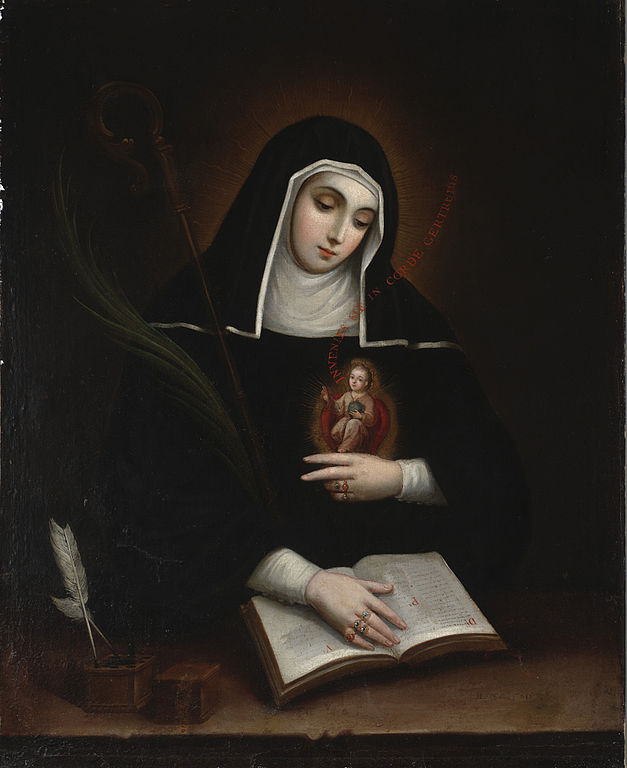Difference between revisions of "Template:POTD protected"
Occultwiki (talk | contribs) |
Occultwiki (talk | contribs) |
||
| (58 intermediate revisions by the same user not shown) | |||
| Line 1: | Line 1: | ||
{| role="presentation" style="margin:0 3px 3px; width:100%; text-align:left; background-color:transparent; border-collapse: collapse; " | {| role="presentation" style="margin:0 3px 3px; width:100%; text-align:left; background-color:transparent; border-collapse: collapse; " | ||
|style="padding:0 0.9em 0 0;" | [[File: | |style="padding:0 0.9em 0 0;" | [[File:Santa Gertrudis-1763.jpg|300px|thumb|]] | ||
|style="padding:0 6px 0 0"| | |style="padding:0 6px 0 0"| | ||
'''[[ | '''[[Gertrude the Great]]''' was a German Benedictine nun and mystic. She is recognized as a [[saint]] by the Catholic Church and by The Episcopal Church. In 1281, at the age of 25, she experienced the first of a series of visions that continued throughout her life, and which changed the course of her life. Her priorities shifted away from secular knowledge and toward the study of [[Bible|scripture]] and theology. Gertrude devoted herself strongly to personal prayer and [[meditation]], and began writing spiritual treatises for the benefit of her monastic sisters. Gertrude became one of the great mystics of the 13th century. Together with her friend and teacher Mechtilde, she practiced a spirituality called "nuptial mysticism," that is, she came to see herself as the Bride of [[Jesus Christ|Christ]]. | ||
<p><small>Artist: | <p><small>Artist: Miguel Cabrera</small></p> | ||
[[:Category:Images|'''(More Images)''']] | [[:Category:Images|'''(More Images)''']] | ||
<div class="potd-recent" style="text-align:right;"> | <div class="potd-recent" style="text-align:right;"> | ||
Latest revision as of 22:09, 1 January 2026
|
Gertrude the Great was a German Benedictine nun and mystic. She is recognized as a saint by the Catholic Church and by The Episcopal Church. In 1281, at the age of 25, she experienced the first of a series of visions that continued throughout her life, and which changed the course of her life. Her priorities shifted away from secular knowledge and toward the study of scripture and theology. Gertrude devoted herself strongly to personal prayer and meditation, and began writing spiritual treatises for the benefit of her monastic sisters. Gertrude became one of the great mystics of the 13th century. Together with her friend and teacher Mechtilde, she practiced a spirituality called "nuptial mysticism," that is, she came to see herself as the Bride of Christ.
Artist: Miguel Cabrera |
